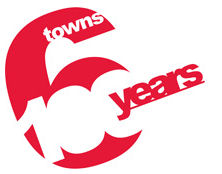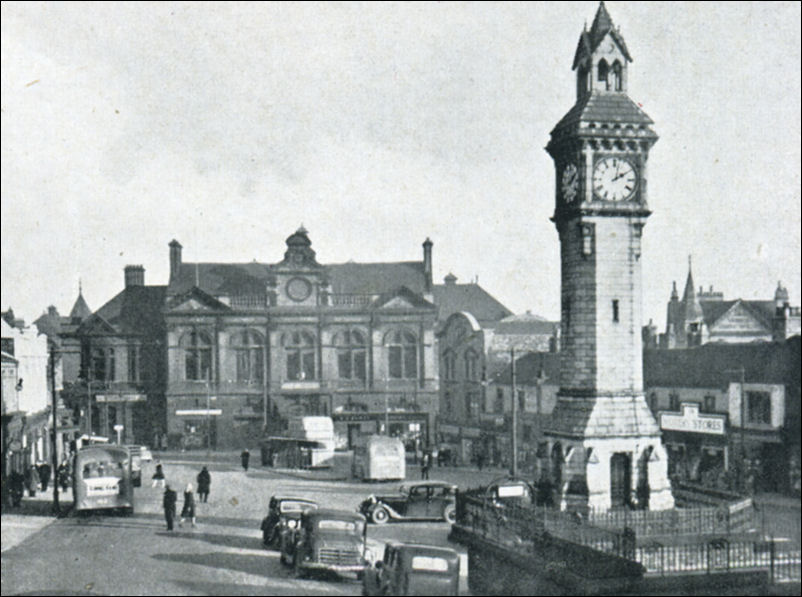![]()
|
|
|
|
|
Stoke-on-Trent - photo of the week |
Advert of the Week
Potworks of the Week
Tunstall
Market Square and Town Hall

|
Scenes in the Six Towns "It is natural that to some extent the six towns now federated as the city of Stoke-on-Trent should have their independent lives and local associations existing side by side with their corporate life and wider civic associations. Here then is a short special reference to each Pottery-town." 1947 City of Stoke-on-Trent Official Handbook |

Tunstall Market Square
and Town Hall c.1947
|
|
Tunstall in 1828 TUNSTALL is a considerable village within the township of Tunstall Court, a liberty in the parish of Woolstanton, four miles from Newcastle, pleasantly situated on an eminence, deriving its name from the Saxon word, tun or ton, a town, and stall, an elevated place, seat or station. The grand Trunk canal is within half a mile of the village; and the Harecastle tunnel, running nearly two miles underground, is within a short distance. A second tunnel, parallel with the first, has lately been completed here, at a cost of £100,000, which will much expedite the conveyance of merchandize. Walter Sneyd, Esq. of Keel, is lord of the manor, and holds courts leet at certain periods, when a constable is chosen for the government of the town. There is no church in the village, but £1,000 has been subscribed by some worthy and spirited individuals, in anticipation of being aided by government in the erection of one, the want of which being much felt. Thursfield, or 'New Chapel,' is a chapel of ease under Woolstanton, of which the Rev. John Lawton is the incumbent, and the Rev. Wm. Carter, curate. In this chapel was interred the celebrated canal engineer, James Brindley. The places of worship in the village are three chapels for the Methodists. In this township abounds coal, ironstone, marl and fine channel coal; and the manufactories of earthenware are very extensive here. The market is on Thursday, which is well supplied with provisions and commodities, as well as with shoes, hats and other articles of wear. Tunstall Court liberty contained, in 1821, 2,622 inhabitants, and Tunstall township, which is in the parish of Adbaston, 102 persons exclusive." Pigot & Co's 1828/9 Directory of Staffordshire
Tunstall in 1907 (3 years before federation) Tunstall is the youngest of the "five towns" which go to make up the Staffordshire Potteries, but it is one of the most vigorous and flourishing of them. Ward, in his history, so far back as 1843, states that "Tunstall from being a small village of scattered inhabitants had become a large and populous town, and had furthermore exhibited such an extraordinary increase within the present century as could scarcely be paralleled" If this was true of the Tunstall of more than half a century ago, it is more than ever true of the Tunstall of to-day.
The town has a station on the Loop Line of the North Staffordshire Railway, and also a station on the main line (from Stoke to Manchester) on the same railway, at Chatterley. The Trent and Mersey Canal passes it. The town has had the benefit of good and enlightened government for many years past, and there are few modern institutions which it lacks. The Chairman of the Urban Council goes by the name of the Chief Bailiff, or Chief Constable, a title borne by the principal townsman in the early part of the last century. In 1837, the Lighting and Watching Act was adopted; in 1847, the Tunstall Improvement Act (under which the market was bought) came into operation; in 1855, a Local Board of Health was set up; and in 1894, the present Urban Council came into being. The town was divided into two wards, but owing to extensions of boundary, the additional wards of Chell and Goldenhill have been created.
Water and gas are supplied by companies. Burslem Corporation supplies electricity, and the two towns combine in an infectious diseases hospital. There is a cemetery at Clayhills. The Church of England, the Roman Catholic Church, and most of the Free Churches have places of worship in the town.Tunstall is the birthplace of Primitive Methodism, and William Clowes and Hugh Bourne, the founders of the denomination, carried on their spiritual labours in the town and district. The town has many admirable business premises. A go-ahead spirit is manifested on all sides, and there is every sign of continued prosperity. 1907 Staffordshire Sentinel 'Business Reference Guide to The Potteries, Newcastle & District'
|
| Tunstall
"Tunstall is the birthplace of some of the most famous sons and daughters of Stoke-on-Trent. Potters Clarice Cliff and Susie Cooper and musician Robbie Williams all call Tunstall their home. It is the most northern town of the city, with iron its earliest claim to fame, as the material was being produced in Tunstall as early as 1280."
|